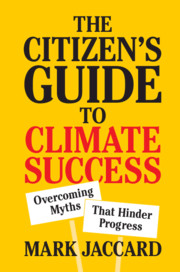The Citizen’s Guide to Climate Success
Humanity has failed for three decades to decarbonize our energy system to address the climate threat, yet average citizens still don’t know what to do personally or what to demand from their politicians. For climate success, we need to understand the combined role of self-interested and wishful thinking biases that prevent us from acting effectively and strategically. Fossil fuel and other interests delude us about climate science or try to convince us that every new fossil fuel investment is beneficial. But even climate-concerned people propagate myths that hinder progress, holding to beliefs that all countries will agree voluntarily on sharing the cost of global decarbonization; that carbon offsets are effective; that behavioral change is critical; that energy efficiency and renewable energy are cheap; and that carbon taxes are absolutely essential. For success with the climate-energy challenge, we must strategically focus our efforts as citizens on a few key domestic sectors (especially electricity and transportation), a few key policies (regulations and/or carbon pricing); and the identification and election of climate-sincere politicians. As leading countries decarbonize their domestic electricity and transportation sectors, they must use various measures, including carbon tariffs, to ensure that their efforts spill over to affect the efforts of all countries. This book offers a clear and simple strategic path for climate-concerned citizens to drive climate success by acting locally while thinking globally.
A PDF version of this title is also available as Open Access on Cambridge Core at doi.org/10.1017/9781108783453.
A professor of sustainable energy at Simon Fraser University in Vancouver, Jaccard has a PhD in economics from the University of Grenoble. He has helped many governments with climate-energy policy, including serving on the China Council for International Cooperation on Environment and Development and the Intergovernmental Panel on Climate Change. In the 1990s, he chaired British Columbia’s utilities commission and in the 2000s he helped design its famous carbon tax, clean electricity standard and other climate-energy policies. He is a member of the Royal Society of Canada in recognition of his research, and a frequent media presence in Canada and the US. His book, Sustainable Fossil Fuels (Cambridge, 2005), won the Donner Prize. His efforts on the climate challenge range from testifying before the US Congress and the European Commission to being arrested for blocking a coal train, as he explains in this book.

